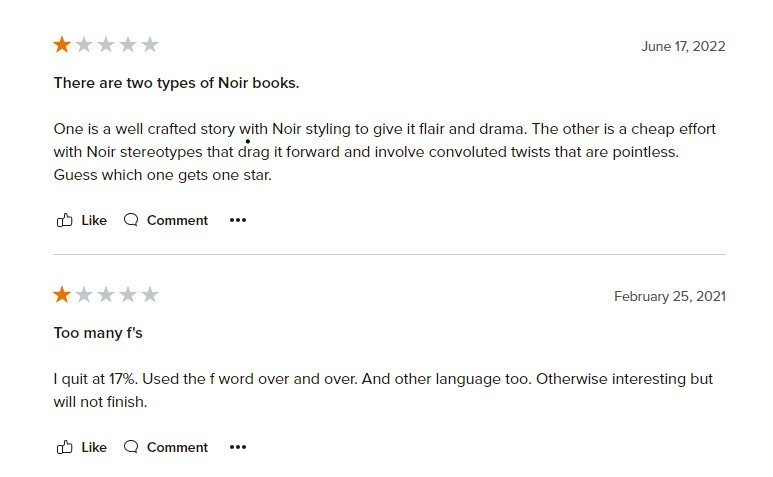Every once in a while, I hear that an author—usually an indie author, unfortunately—reacted in a rude and unprofessional manner to a less than stellar review of their work. Recently, a popular indie author was accused of repeatedly contacting a reviewer to object to critical comments in their review, allegedly threatening or bullying the reviewer (I don’t have, nor am I interested in the specific details). The hostile reaction by some authors to poor reviews has reached the point where some established book reviewers are considering whether or not they should continue writing reviews, especially critical ones.
I want to make it crystal clear where I stand on this issue:
Reviews are for other readers, NOT FOR THE AUTHOR!!!
You don’t like a review of your book? Tough bananas, Bunky. It wasn’t written for you.
You think the reviewer’s opinion was wrong? Of course you do. It doesn’t matter.
You’re afraid bad reviews will hurt your sales? They might. No one is obligated to buy or read your book.
You feel like you were personally attacked? Maybe you were. Wear it and move on.
Reviews are opinions, and every reader has the right to state their opinion of your book, no matter what that opinion might be. If you can’t live with that fact, don’t make your books available to the public. Find something else to do, something that doesn’t invite public scrutiny. Because when you publish a book, it’s fair game. People are free to hate it for any reason they want to, whether you want them to or not.
And no matter how good your book is, some people are going to hate it. HATE IT! No piece of written work that has ever been published has pleased every single person who read it. NONE!
You don’t believe me? Check out these actual 1-star Amazon reviews of highly acclaimed works I found in less than five minutes of searching:
The Great Gatsby: “One of the worst books ever written.”
To Kill a Mockingbird: “It was the most boring story I have ever read.”
A Tale of Two Cities: “The classics usually tickle me. But this was a trudge.”
The Wizard of Oz: “I have no idea why this is so highly regarded: I think it’s a complete failure.”
The Cat in the Hat: “Message: if you disobey your parents, things will still work out.”
You get the idea?
The other day I read a post on social media stating that if reviewers are going to give a book a bad review, they should at least include constructive criticism. WRONG! SIT DOWN!!! I repeat: reviewers are not writing their review for you. Reviewers are not obligated to help you become a better writer. You have NO RIGHT to ask them to.
But what about reviewers who review books on a website or a blog? Shouldn’t they follow different rules than anonymous reviewers on Amazon and Goodreads? No. They’re readers (even if they are also authors), and they are writing their reviews of your book for other readers—NOT FOR YOU! They are stating their opinions of your work, and they are under no obligation to help you improve as a writer, promote your work for you, or even be polite to you. They don’t even have to tell you they are posting a review of your work. Your work is out there in the public. You have NO CONTROL over what anyone thinks about it or what they choose to say about it in a public forum. If you can’t live with that, don’t make your work available to the public.
Here’s something many—maybe even most—writers don’t realize:
Bad reviews are marketing gold!
The reviews above, posted on Goodreads, are for my first book: A Troll Walks into a Bar.
That first one is pretty devastating, right? “A cheap effort”? “Stereotypes that drag”? “Pointless twists”? Brutal, right? Am I offended by any of it? Did this review upset me? Did it make me question whether I should continue my writing career? Nah. This particular reviewer didn’t like my book. That’s okay. Not everybody is going to. The way I figure it, there are about 8 billion people living in the world today. I only need a tiny fraction of them—about 0.00125% of them—to buy my book in order to be a bestselling author. I can live with a few snarky one-star reviews. (Actually, I thought this review was pretty clever, and I got a good laugh out of it.)
The second review made me rub my hands together in glee and say KA-CHING! Why? Because I knew I could use it to increase book sales. I LOVE THIS REVIEW!!! First off, it says something nice about the book: the reviewer found the story “interesting” even while giving the book a poor rating. And what was the reason for the poor rating? Too many naughty words! But lots of readers LOVE those words in their stories. When I posted this review on social media sites, I got an immediate boost in sales. I don’t know who wrote this review, but I owe them a beer. Or a nice cup of decaffeinated tea. Whatever they prefer.
Here’s a 2-star review I received for the audio version of A Troll Walks into a Bar:
“Don’t even THINK about giving this to a kid under 16!!!”
I LOVE IT!!! Can you think of a better way to market a book to teenagers than to tell them they shouldn’t read it? Not me! But, more to the point, the reviewer is right: my book was written for an adult audience. And a lot of adults appreciate that. I know this for a fact, because when I posted this review on social media, sales bumped significantly. Should I find this reviewer and engage them in an argument about the proper level of profanity and violence in modern noir literature? Of course not. I don’t mind at all that we disagree. In fact, I like this review so much, I put the last line of it on my Amazon book page to help promote book sales.
Finally, take a look at this 2-star Amazon review of A Nymph Returns to the Sea:
When I saw this review, I found the reviewer, called him up and told him he was an idiot and that he knew nothing about noir heroes or what being “woke” really means.
JUST KIDDING!!!
Actually, what I did was post the review on social media and watch the sales for the book spike. I mean, come on—everything this reader criticized about the book is what makes it appealing to other readers! Take away the heading and the last line, and it’s a damned good promo! I could put it on the back cover! And besides all that, readers who support inclusiveness and social equality (like me) are going to respond in a positive way to this negative review. In fact, the numerous comments I received in response to this post on Twitter and Bluesky were universally positive.
Which brings me to my last point:
The fastest way to kill your writing career is to respond in a negative way to a critical review
Fact: readers (generally speaking) HATE bullies, jerks, and whiners. A great many fabulous reviewers have taken the time to build beautiful websites so that they can invest even more of their time writing heartfelt and thoughtful reviews of books, usually at their own expense. The vast majority of them do it for fun and to provide a free service to their fellow readers out of the goodness of their hearts. Authors should be grateful they are willing to do it, and no reviewer deserves to have the joy taken out of their lives as a result of their efforts.
We live in a golden age of publishing. Book outlets are overflowing with terrific books, so many of them that none of us can read them all. And, no matter who you are or how successful you’ve been, your book is not essential to anyone. If you give us a reason, we’ll choose to read someone else’s book instead of yours— for strictly personal reasons—and there’s nothing you can do about it.








I practically opened a bottle of bubbly when I got my first 1-star review. I still get the occasional review that puzzles me (like the one that says all my characters are blond), but hey - a story only happens half in my mind, and half in the readers'.
So my main take away from you post: I should go back to sharing more of these review of social media 😁
That is the way I think. I am just a reader, but I think that I can have an opinion. Perhaps I am a bit harder to please than some. I am 67, and have read science fiction and fantasy for 60 years. I like my science fiction old-fashioned. All the science correct, except the bit that is fiction. So I point out when the author breaks natural and physics laws. I do the same with fantasy, when the sun rises in the west so to say. In historical fiction when Vikings or Neanderthals eat potatoes.
This has led to me being "reported" on Amazon Kindle. I am quite sure by sensitive authors, who can't bother to do basic research.
I have been told I break their rules. Which basically say that I am allowed only to gush. I have tried multiple times to at least be allowed to know which book it was, and how I broke the rules...
Never an answer.
The other day I got another warning. I know exactly which book it must have been. It called itself post-apocalyptic science fiction.
"Cosmic radiation gathered in a green haze and flowed down the mountainside ."
I wasn't nice. But I still gave it 4 stars, because the plot was good.
I always read the poor reviews, exactly for the reason you wrote. I like profanity and some sex in my post-apocalyptic reading.
Please see if you can't squeeze out more Alex stories. Or make him a guest star.
Yours, Ann-Catherine